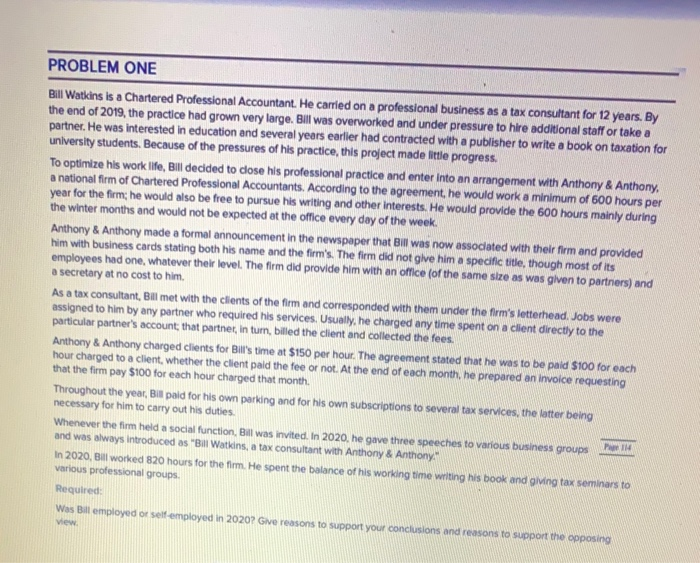PROBLEM ONE Bill Watkins is a Chartered Professional Accountant. He carried on a professional business as a tax consultant for 12 years. By the end of 2019, the practice had grown very large. Bill was overworked and under pressure to hire additional staff or take a partner. He was interested in education and several years earlier had contracted with a publisher to write a book on taxation for university students. Because of the pressures of his practice, this project made little progress To optimize his work life, Bill decided to close his professional practice and enter into an arrangement with Anthony & Anthony, a national firm of Chartered Professional Accountants. According to the agreement, he would work a minimum of 600 hours per year for the firm; he would also be free to pursue his writing and other interests. He would provide the 600 hours mainly during the winter months and would not be expected at the office every day of the week. Anthony & Anthony made a formal announcement in the newspaper that Bill was now associated with their firm and provided him with business cards stating both his name and the firm's. The firm did not give him a specific title, though most of its employees had one, whatever their level. The firm did provide him with an office of the same size as was given to partners) and a secretary at no cost to him. As a tax consultant, Bel met with the clients of the firm and corresponded with them under the firm's letterhead. Jobs were assigned to him by any partner who required his services. Usually, he charged any time spent on a client directly to the particular partner's account that partner, in turn, billed the client and collected the fees. Anthony & Anthony charged clients for Bill's time at $150 per hour. The agreement stated that he was to be paid $100 for each hour charged to a client, whether the client paid the fee or not. At the end of each month, he prepared an invoice requesting that the firm pay $100 for each hour charged that month. Throughout the year, Bill paid for his own parking and for his own subscriptions to several tax services, the latter being necessary for him to carry out his duties Whenever the firm held a social function, Bill was invited. In 2020, he gave three speeches to various business groups and was always introduced as "Bal Watkins, a tax consultant with Anthony & Anthony." in 2020, Bill worked 820 hours for the fim. He spent the balance of his working time writing his book and giving tax seminars to various professional groups Required: Was Bill employed or self employed in 2020? Give reasons to support your conclusions and reasons to support the opposing PTM View PROBLEM ONE Bill Watkins is a Chartered Professional Accountant. He carried on a professional business as a tax consultant for 12 years. By the end of 2019, the practice had grown very large. Bill was overworked and under pressure to hire additional staff or take a partner. He was interested in education and several years earlier had contracted with a publisher to write a book on taxation for university students. Because of the pressures of his practice, this project made little progress To optimize his work life, Bill decided to close his professional practice and enter into an arrangement with Anthony & Anthony, a national firm of Chartered Professional Accountants. According to the agreement, he would work a minimum of 600 hours per year for the firm; he would also be free to pursue his writing and other interests. He would provide the 600 hours mainly during the winter months and would not be expected at the office every day of the week. Anthony & Anthony made a formal announcement in the newspaper that Bill was now associated with their firm and provided him with business cards stating both his name and the firm's. The firm did not give him a specific title, though most of its employees had one, whatever their level. The firm did provide him with an office of the same size as was given to partners) and a secretary at no cost to him. As a tax consultant, Bel met with the clients of the firm and corresponded with them under the firm's letterhead. Jobs were assigned to him by any partner who required his services. Usually, he charged any time spent on a client directly to the particular partner's account that partner, in turn, billed the client and collected the fees. Anthony & Anthony charged clients for Bill's time at $150 per hour. The agreement stated that he was to be paid $100 for each hour charged to a client, whether the client paid the fee or not. At the end of each month, he prepared an invoice requesting that the firm pay $100 for each hour charged that month. Throughout the year, Bill paid for his own parking and for his own subscriptions to several tax services, the latter being necessary for him to carry out his duties Whenever the firm held a social function, Bill was invited. In 2020, he gave three speeches to various business groups and was always introduced as "Bal Watkins, a tax consultant with Anthony & Anthony." in 2020, Bill worked 820 hours for the fim. He spent the balance of his working time writing his book and giving tax seminars to various professional groups Required: Was Bill employed or self employed in 2020? Give reasons to support your conclusions and reasons to support the opposing PTM View







